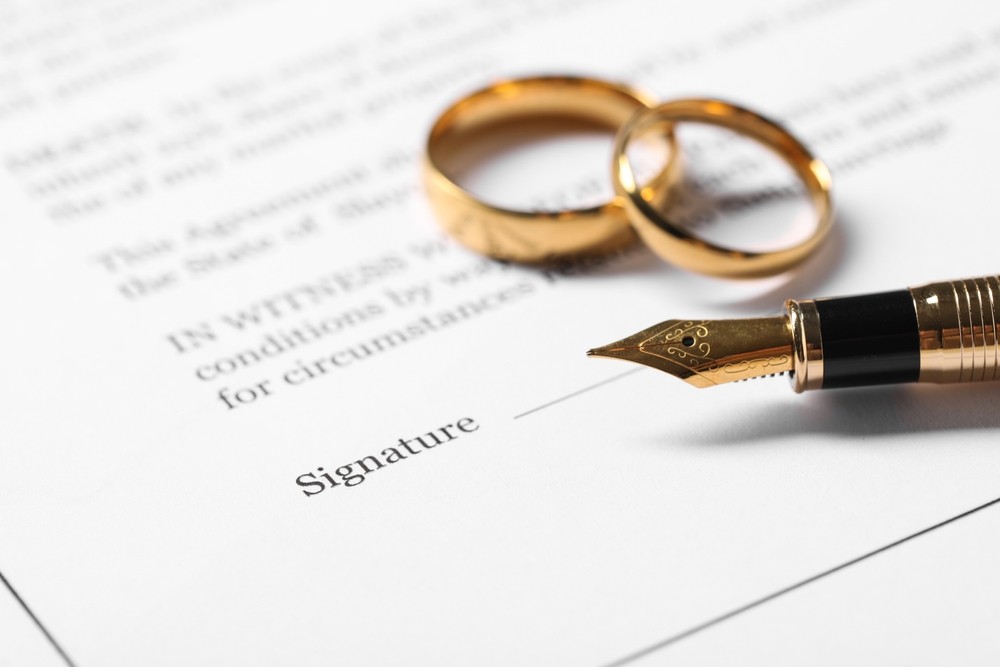When you get married, the chances are you plan to spend the rest of your life with that person. Within the midst of wedding planning, organising your honeymoon and daydreaming about your future together, it’s unlikely you even want to consider what would happen if you broke up. But, is this an error?
Whether you like it or not, for many couples, divorce in the future is a real possibility. Considering divorce is one of the most stressful things someone can go through, it might be worth considering how your possessions, money and assets would be divided should you and your partner decide to go your separate ways.
Prenuptial agreements are a good solution to this predicament. Much like writing a Will, a prenuptial agreement can prepare you for something that you might not want to think about. Depending on when you might have first heard the term prenuptial agreement (or prenup), you may have different versions of what it means and how it functions within the legal system, so let’s get into it.
What is a Prenuptial Agreement?
A prenuptial agreement is a legal document that is drawn up before (pre) a couple have a wedding (nuptial). This type of agreement will outline how the assets will be divided should the relationship end in divorce. The purpose of this document is to give couples clarity on what they agreed would happen to their assets should the relationship end.
As divorce rates have risen over the last few decades, so have the amount of people getting prenuptial agreements. It’s reported by the Marriage Foundation that 1 in 5 couples have a prenuptial agreement, which is thought to have risen significantly since the 1980s.
Is it a Legally Binding Document?
In England and Wales, it’s important to note that although a prenuptial agreement is a legal document and would be taken into consideration, the courts may rule against it. Throughout the duration of a marriage, circumstances might change which can make the details of a prenuptial agreement no longer fair or appropriate.
For example, if the couple have had children since the agreement was created, this could change the way things should be split. If this is not taken into consideration in the agreement, it will be in court. Although the courts would not completely disregard a prenuptial agreement, it is merely a factor amongst many others to be taken into account, not the be all and end all.
This is why revisiting legal documents every few years to make sure they’re up to date can be helpful. Getting advice from family lawyers is always advised, as they can help with any new terms that need to be added.
Who Should Get a Prenuptial Agreement?
In short, anyone who wants to have a prenuptial agreement in place can have one. However, there are certain groups of people who are more likely to have one. For example, when one partner has more assets or assets they’re going to inherit, they might wish to have an agreement in place to protect them from having to split them. There are also some other common groups of people that decide to get a prenuptial agreement, these include but are not limited to:
- People who have a lot of assets or wealth
- Couples with children, especially children from previous marriages
- People with a large inheritance
- Business owners who wish to keep full ownership of their business
- People who have struggled with debt or may do in the future
There are other reasons that people may wish to get a prenuptial agreement and each situation is dealt with on a case by case basis.
The Benefits of Having a Prenuptial Agreement
Although some people see getting a prenuptial agreement as almost a contradiction to the idea of marriage itself, as we’ve discussed there are many reasons to get a prenuptial agreement. Some of the key benefits are:
Asset Protection: If you or your partner has assets that they would like to protect, these can be included in a prenuptial agreement. These can be assets that they already have before getting married, or assets they expect to accrue in the future, such as inheritance.
Transparency Between Partners: As much as you would like to believe the person you marry is going to be the person you stay with forever, preparing for the eventuality of a divorce and how that would look can increase transparency and communication between partners. Being aware of how you would like things to be split can open up a line of communication that otherwise not be spoken about until tension is high, making it more difficult to make clear and practical decisions.
Simplification of the Divorce Process: Legal planning is always useful. Although you might not want to think about relationship breakdowns, it’s no secret that divorces can get complicated. Having a plan in place can not only create more clarity, but also provide both partners with peace of mind, as they can lay out their expectations in a legal document and the other has agreed to the terms. It’s worth noting that each case and person is different, so having a prenuptial agreement cannot guarantee an amicable divorce, but it can help to put your best foot forward.
Protect the Interests of Children: Although prenuptial agreements aren’t legally binding when it comes to things like custody agreements, they can be useful in other ways. For example, they can help to protect children financially by outlining how they will be provided for, and how assets will be distributed should their parents get a divorce. This can be especially helpful if one or both partners have children from previous partners, as it will allow a clear outline to make sure the children are provided for.
Clarity Surrounding Debt: When you get married, you take on more than just the person. You also become financially tied to them. If your partner struggles with debt, or may do in the future, a prenuptial agreement can help to separate you from the responsibility of this debt should you and your partner get divorced. On the flipside, if you struggle with debt yourself, a prenuptial agreement can shield your partner from this should you part ways.
Getting Legal Support
When it comes to matters like prenuptial agreements, we understand that this can be a sensitive topic. Like all things surrounding family law, prenuptial agreements require a solicitor who knows how to deal with each case sensitively, whilst also giving each party any relevant information they need, and ensuring they’re clear on what’s been agreed.
That’s where we come in. At Barrett and Co Solicitors, we pride ourselves on helping our clients find the best solution for them, especially when it surrounds their family. Get in touch today and see how we can support you.





